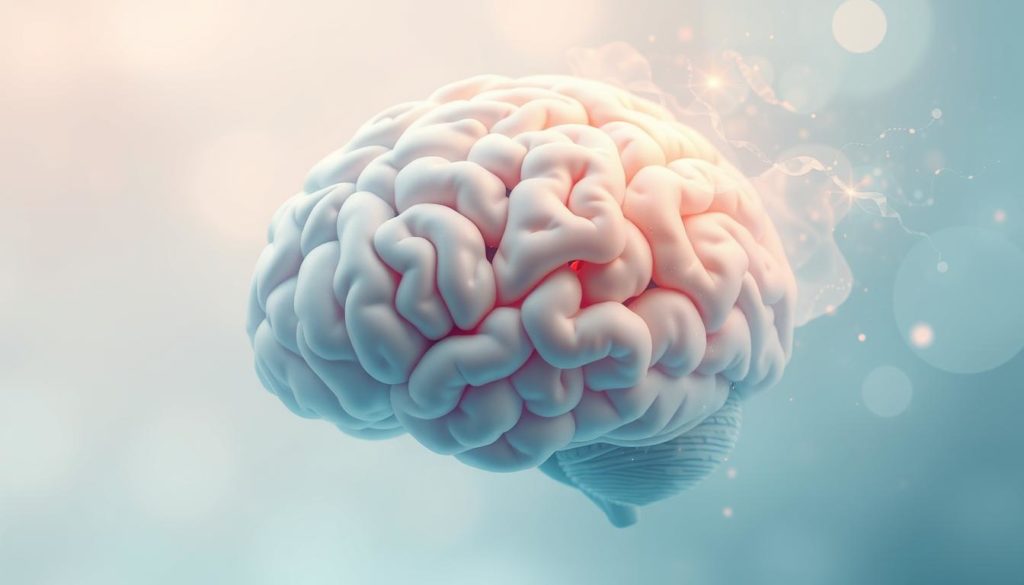Nearly 6.2 million Americans over 65 are affected by Alzheimer’s Disease. This fact highlights the widespread impact of this brain disorder. Alzheimer’s leads to memory loss and is caused by many risk factors.
Alzheimer’s Disease slowly steals memories and abilities. It’s caused by changes in the brain, genes, and lifestyle. Age makes these issues more likely, increasing the risk of Alzheimer’s.
Learning more about Alzheimer’s is vital. Joining clinical trials can help us make progress. Together, we can offer hope to millions living with Alzheimer’s Disease.
Introduction to Alzheimer’s Disease
Alzheimer’s disease is a brain disorder that gets worse over time. It leads to memory loss and problems with thinking. Proteins build up in the brain, harming its cells and making it smaller. People with Alzheimer’s gradually lose their memory and ability to do things.

What is Alzheimer’s Disease?
Alzheimer’s disease often goes hand in hand with dementia. This term covers conditions that cause thinking problems. It’s mainly seen in older adults. Alzheimer’s damages the brain’s communication lines, starting with mild forgetfulness. Eventually, it makes people fully depend on others for their care.
Common Symptoms and Progression
Early signs of Alzheimer’s symptoms can be forgetting recent events or conversations. As it progresses, these problems get worse. People may have trouble speaking, feel lost, and act differently. The Alzheimer’s progression moves from simple forgetfulness to losing physical abilities. This requires constant care.
The path of Alzheimer’s is different for each person. Catching it early and managing symptoms can make life better for those affected. Researchers are working hard to find ways to treat and support patients. Their goal is to slow down the disease’s impact and ease its challenges.
Aging and Alzheimer’s Risk Factors
As we get older, our brain health might start to go downhill. This makes aging a big risk factor for Alzheimer’s disease. Most people who get this condition are over 65. The older we get, the higher our risk becomes.

The Impact of Age on Brain Health
Our brains change as we age, like shrinking in some parts, inflammation, and damage to blood vessels. These changes can lead to Alzheimer’s. Additionally, when the energy in cells goes down, it can harm neurons. This shows how aging and Alzheimer’s are connected.
Age-Related Brain Changes
One major part of Alzheimer’s risk is changes in the brain as we age. Here are some key changes:
- Shrinkage in certain brain areas affects our thinking.
- Inflammation that messes with normal brain activities.
- Blood vessel damage that cuts down on nutrients and oxygen to the brain.
- Decreased energy production in cells that causes neuron damage.
It’s important to understand how aging affects Alzheimer’s risk. For example, one in 13 people between 65 and 84 get Alzheimer’s. For those over 85, the risk goes up to one in three. Age is a key factor in the likelihood of developing Alzheimer’s.
Genetic Predisposition in Alzheimer’s
Genetics play a big role in Alzheimer’s, especially with certain gene types that up the risk. A key example is the APOE ε4 allele, known for its links to Alzheimer’s genetics. This specific gene can greatly raise the chance of getting the disease.
Yet, it’s vital to know that a genetic risk doesn’t mean you’ll definitely get Alzheimer’s. Many gene mutations, along with environmental and lifestyle factors, affect this risk. These elements influence how genetic risks show up in different people.
Research indicates that genetics are important in Alzheimer’s, but they’re part of a bigger picture. Even with the APOE ε4 allele, which ups the risk, it’s not the only factor. Other genes, like mutations in APP, PSEN1, and PSEN2, can also predict Alzheimer’s but are rarer than APOE ε4.
The study of Alzheimer’s genetics helps us grasp the disease’s complexity. It shows us how the disease can vary from one person to another.
Environmental Factors in Alzheimer’s Disease
Recent studies have shown that environmental factors play a big role in Alzheimer’s disease. Things like exposure to air pollution help speed up cognitive decline. This leads to Alzheimer’s sooner. Learning about these factors helps in finding ways to prevent the disease.
Exposure to Air Pollution
Air pollution, especially from traffic and wood fires, is linked to a higher dementia risk. Polluted air has tiny particles that harm the brain. They cause inflammation and damage nerve cells. This connection between air pollution and brain health highlights the need to tackle environmental issues for Alzheimer’s.
There is a lot of evidence showing how environment, genes, and lifestyle work together in Alzheimer’s. Fully understanding these factors can lead to new ways to lower the risk of getting Alzheimer’s.
Understanding Causes of Alzheimer’s Disease
The reasons behind Alzheimer’s disease are complex. They include genetics, the environment, and how we live. It’s key to understand how these factors work together. This helps find better ways to prevent and treat the disease.
Combination of Factors
Many things lead to Alzheimer’s. Aging is the biggest risk, but genes and lifestyle matter too. Things like what you eat and how much you move can affect your risk. Learning about these risk factors is critical.
Key Proteins Involved
Two main proteins, amyloid plaques and tau tangles, play a big part in Alzheimer’s. Plaques mess up neuron talks. Tangles shake up neuron insides. These lead to neuron damage and death. Understanding how these proteins act is crucial for new treatments.
Lifestyle Choices and Alzheimer’s
Recent studies highlight how our daily choices affect Alzheimer’s disease risk. Eating well, staying active, and keeping connected with others are key. They help our brains stay healthy.
Diet and Physical Activity
Eating foods rich in antioxidants and healthy fats supports our brain. The Mediterranean or DASH diets are especially good. They focus on fruits, veggies, lean meats, and whole grains.
Exercising regularly also plays a big role. Activities like walking, swimming, or yoga boost brain function. They lower the risk of Alzheimer’s.
Social Engagement and Mental Stimulation
Keeping in touch with people and staying mentally active are crucial. Being social keeps our minds sharp. Meanwhile, reading, puzzles, and learning new things improve brain health.
Staying both socially and mentally active slows down memory loss. It also makes life more enjoyable.
Combining healthy living with Alzheimer’s prevention efforts benefits our brain and overall health. It’s a powerful mix for staying well.
Brain Health and Cognitive Decline
Keeping your brain health in top shape is key as we get older. The aging process can change how our brains work and look. These changes might lead to cognitive decline.
Researchers keep finding ways to keep our brains healthy. They say it’s important to keep your mind active, exercise regularly, and eat well. These steps can fight the reasons our brains might not work as well as we age.
“Brain health is an evolving field, and as we unravel more mysteries through research, tailored interventions to halt cognitive decline will become more robust.” – Dr. Maria Carrillo, Chief Science Officer, Alzheimer’s Association.
Let’s look at how different factors affect brain health and cognitive decline:
| Factors | Impact on Brain Health | Cognitive Decline Causes |
|---|---|---|
| Regular Physical Activity | Promotes better brain function and memory | Reduces risk of cognitive problems, delays decline |
| Balanced Diet | Supports overall neural health | Decreases chances of cognitive impairment |
| Mental Stimulation | Enhances cognitive reserves | Delays onset of cognitive decline disorders |
Knowing how these factors play a role is crucial for keeping our brains healthy. By choosing activities that support our brain, we can fight off cognitive decline.
The Role of Chronic Health Conditions
Chronic conditions like heart disease, diabetes, and obesity can increase Alzheimer’s risk. Understanding these links can improve overall health. This might even lower the chances of cognitive decline.
Heart Disease and Stroke
Heart disease and stroke increase Alzheimer’s risk. Poor heart health limits blood flow to the brain. This can lead to memory issues.
Keeping your heart healthy is crucial. Do this through diet, exercise, and not smoking. It will lower your Alzheimer’s risk.
Diabetes and Obesity
Diabetes and obesity greatly affect Alzheimer’s risk. High blood sugar and inflammation from diabetes can harm brain cells. This may cause memory problems.
Obesity impacts brain health negatively too. To lower Alzheimer’s risk, maintain a healthy weight. Stay active and eat well.
Emerging Research and Future Directions
Alzheimer’s research has made big steps forward. It’s now focusing on early brain changes. This could lead to early ways to help or prevent Alzheimer’s.
One key area of study is genetics. This could lead to personalized ways to prevent or treat Alzheimer’s. Scientists are also looking at how diet, exercise, and mental activities can help brain health.
The future of Alzheimer’s research looks hopeful. The goal is to create better tests and treatments for early stages of the disease. The main aim is to fight Alzheimer’s worldwide, improving life for those affected. With new ideas and teamwork, we’re getting closer to beating Alzheimer’s.
FAQ
What are the causes of Alzheimer’s Disease?
Alzheimer’s Disease happens from a mix of brain changes as we age, our genes, where we live and work, and how we live. Important proteins mess up neuron function in the brain.
What is Alzheimer’s Disease?
Alzheimer’s Disease is a condition that slowly worsens memory and thinking skills. It’s the main reason older adults get dementia, which harms their ability to think and behave normally.
What are the common symptoms and progression of Alzheimer’s?
Alzheimer’s starts with small memory issues. It can get worse, affecting serious memory and abilities. Eventually, it requires constant care.
How does age impact Alzheimer’s risk factors?
Being older than 65 greatly raises Alzheimer’s risk. The risk grows as you get much older, especially after 85, due to changes in the brain.
What are the age-related brain changes that contribute to Alzheimer’s?
As we get older, our brains may shrink in certain parts and see inflammation and blood vessel damage. These changes can hurt neurons and lead to Alzheimer’s.
How do genetic factors influence the likelihood of developing Alzheimer’s?
Genes play a big part in Alzheimer’s risk. Having specific gene versions can increase your risk. Some genes might even make the disease certain, though everyone’s experience with these genes can vary.
How do environmental factors like air pollution contribute to Alzheimer’s?
Things like air pollution from cars and wood smoke can increase dementia risk. This pollution affects our brain’s health.
How do various factors contribute to the causes of Alzheimer’s Disease?
Alzheimer’s comes from different factors working together. It’s crucial to know these factors for prevention and finding the right treatments.
What key proteins are involved in Alzheimer’s Disease?
Amyloid plaques and tau tangles are major proteins in Alzheimer’s. They mess up how neurons work and cause cell death, leading to Alzheimer’s symptoms.
How do diet and physical activity affect Alzheimer’s disease?
Eating well and staying active might help lower Alzheimer’s risk. They keep the brain healthy and lessen other risks.
What role do social engagement and mental stimulation play in Alzheimer’s?
Keeping up with friends and staying mentally active may reduce Alzheimer’s risk. They help maintain brain health and fight off risks linked to losing thinking skills.
How does brain health relate to cognitive decline?
Healthy brains are important for thinking clearly. When the brain changes due to aging or risks, it can lead to losing thinking and memory skills, signaling Alzheimer’s or other dementias.
What chronic health conditions are linked to Alzheimer’s risk?
Conditions like heart disease, stroke, diabetes, and obesity can increase Alzheimer’s risk. Managing these can help keep your mind sharp and prevent dementia.
What advancements are being made in Alzheimer’s research?
Scientists are looking into early brain changes, figuring out genetics, and testing how lifestyle changes might help. They aim to find ways to spot Alzheimer’s early, diagnose it right, and treat it effectively.


